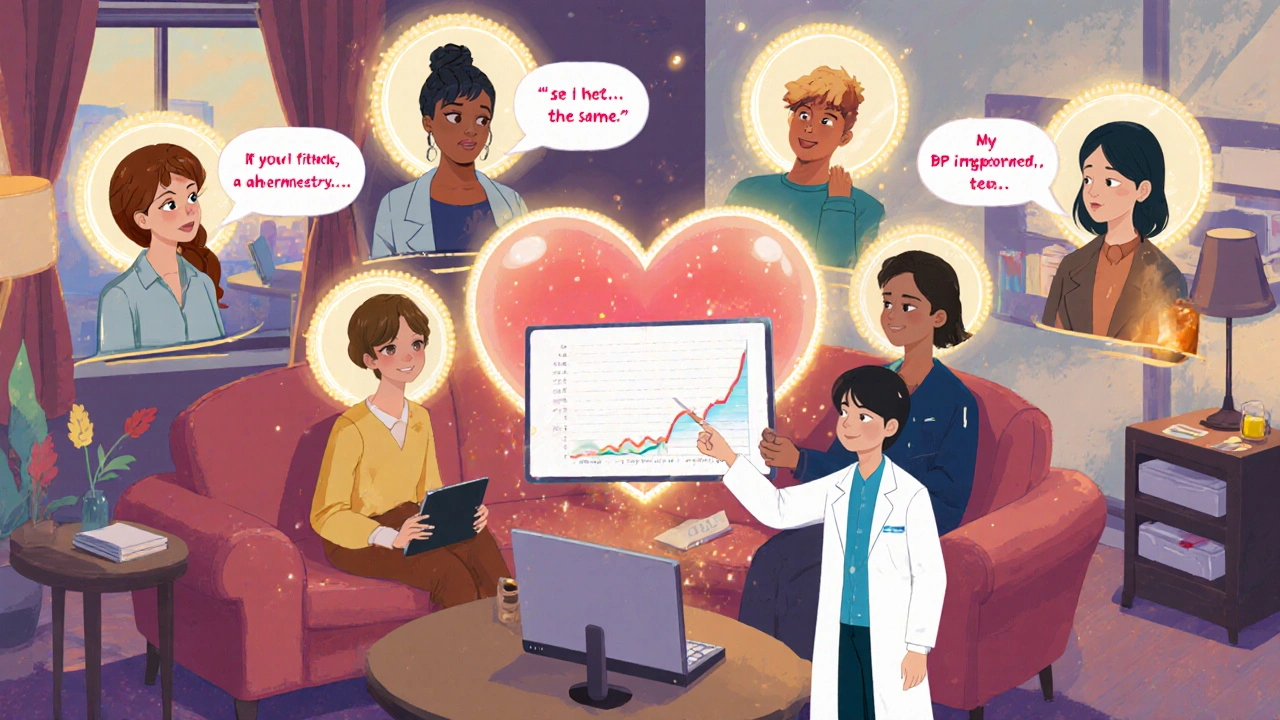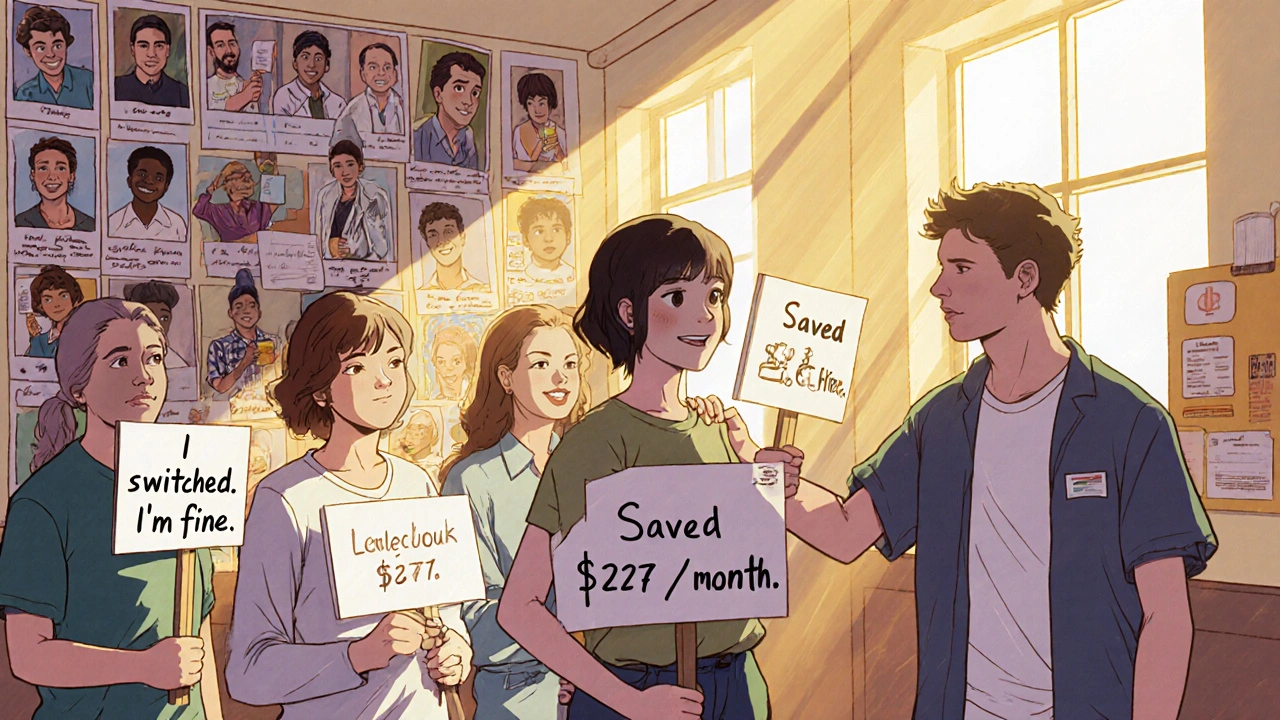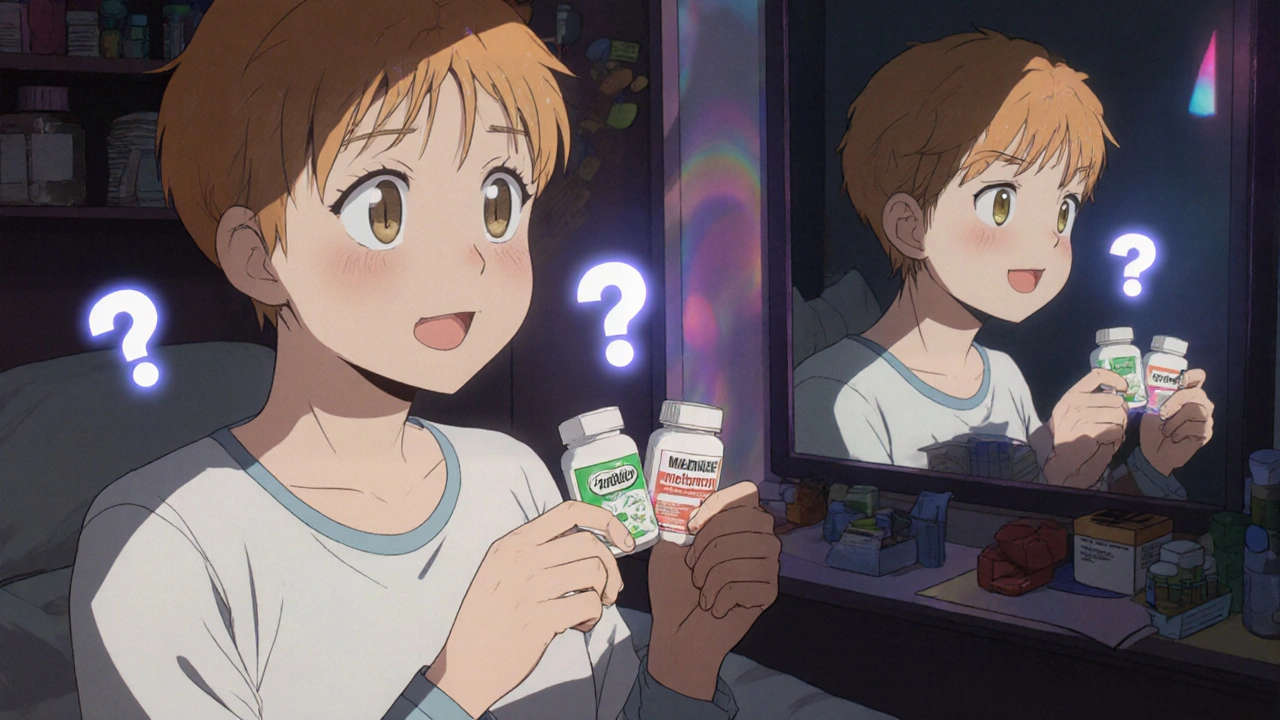Switching from a brand-name drug to a generic can feel like stepping into the dark. You’ve been taking the same pill for years. The box looks different. The color changed. The shape isn’t the same. And now, your body feels… off. You’re not crazy. Thousands of people feel this way. But here’s what most don’t tell you: generic medications work. And patient support groups are where people find out why.
Why Do People Doubt Generics?
It’s not about being stubborn. It’s about fear. You’ve been told your brand-name drug is the best. Maybe your doctor said it. Maybe your mom swore by it. Then, the pharmacy hands you a new pill-same active ingredient, same dose, but cheaper. And suddenly, you start noticing things. A headache. A stomach ache. A feeling that the drug just isn’t doing its job. The truth? For most people, nothing changed. The FDA requires generics to be within 80% to 125% of the brand’s effect in the body. That’s not a guess. That’s science. But your body doesn’t read FDA reports. It reacts to how you feel. And when you expect something to be different, your brain can make you feel it-even if it’s not there. This is called the nocebo effect. And it’s real.What Do Patient Support Groups Actually Do?
These aren’t just online forums where people complain. They’re structured communities-sometimes online, sometimes in community centers-where people who’ve been through the same switch talk honestly. On Facebook groups like “Generic Medication Users United,” 14,300 members share what happened when they switched from brand-name statins, blood pressure meds, or diabetes drugs. New members often come in scared: “I feel worse since I switched. Am I imagining this?” Within days, they get replies: “I felt the same. Thought I was going crazy. Then I tracked my blood pressure for two weeks. It was better than before.” Or: “My pharmacist checked my lab results. No change. Your body just needs time.” The magic isn’t in the advice. It’s in the validation. When someone says, “I felt that too,” it removes the shame. You’re not broken. You’re not wrong. You’re just human.How Do These Groups Help You Stick to Your Meds?
Adherence is the silent killer in chronic disease. People stop taking their meds because they’re expensive. Or confusing. Or because they think the generic doesn’t work. The FDA found that patients on generics have 15% to 20% higher adherence rates than those on brand names-mostly because they cost less. But money isn’t the whole story. A University of Chicago study showed that patients in support groups were 27% more confident in generics. That confidence didn’t come from a pamphlet. It came from hearing someone say, “I took this for six months. My cholesterol dropped. I didn’t lose my job. I didn’t get sick.” Real stories. Real results. One group in Texas helped diabetes patients switch from expensive insulin analogs to biosimilars. The average monthly savings? $327. Not just money. Peace of mind. No more choosing between meds and groceries.
What Makes a Good Support Group?
Not all are created equal. Some Reddit threads have no moderation. Someone posts, “My generic made me dizzy,” and ten others say, “Same!”-but no one checks if it’s the drug or the disease getting worse. That’s dangerous. The best groups have one thing: professional oversight. A pharmacist or nurse checks claims. They link personal stories to real data. For example, when someone says, “My generic seizure med isn’t working,” the group doesn’t just say, “Try a different one.” They say, “The FDA says generics for epilepsy are bioequivalent. But here’s what JAMA found in 47 studies-no difference in control rates. Let’s talk to your neurologist about your dose.” Groups that do this reduce misinformation by 75%. A 2009 study found 34% of online discussions had false claims. With pharmacist review, that dropped to 8%.Where to Find the Right Group
Start with your pharmacy. Many now partner with support groups. Ask if they host monthly meetups. Look for groups linked to the Association for Accessible Medicines-they’re vetted. Check if your hospital has a chronic disease program. Medicare patients are 58% more likely to join than those with private insurance, so if you’re on Medicare, you’re in the right demographic. Online? Search for condition-specific groups. “Hypertension Generic Users” or “Type 2 Diabetes Generics Support.” Avoid broad ones like “Medications” or “Drugs.” Too noisy. Too many opinions without facts. And if you can’t find one? Start one. All you need is a Facebook group, a few people who’ve switched, and a local pharmacist willing to answer questions once a month. That’s enough to begin.
What About the Bad Stories?
Yes, some people feel worse after switching. But that doesn’t mean the generic failed. Sometimes, it’s the filler-non-active ingredients. Different brands use different dyes or binders. A few people are sensitive to them. It’s rare, but it happens. If you feel worse, don’t quit. Talk to your group. Then talk to your doctor. Maybe you need a different generic-there are often three or four made by different companies. Or maybe you need a different formulation. One person in a hypertension group switched from a tablet to a capsule and stopped having stomach issues. It wasn’t the drug. It was the shell. The worst thing you can do? Stop taking your meds because you think the generic is “weaker.” That’s what led to the 2019 incident where 17 people stopped their epilepsy meds after a Facebook group blamed generics for worsening seizures. Turns out, their disease was progressing. The group didn’t have a doctor. They had fear.Why This Matters Beyond You
Generic drugs save Americans $313 billion a year. That’s money for more kids’ vaccines, more cancer screenings, more mental health care. But 13% of prescriptions are still brand-name when a generic exists. Why? Because patients don’t trust them. Patient support groups are the missing link between science and trust. They don’t replace doctors. They don’t replace data. They replace silence with stories. And stories change behavior. The FDA now calls these groups “real-world evidence.” That means your experience-your story-can help shape how drugs are approved, priced, and prescribed. You’re not just saving money on your pills. You’re helping others who come after you.What You Can Do Today
1. If you’re on a generic: Share your story. Even if it’s just one sentence. “I switched to generic lisinopril. My BP is better. No side effects.” 2. If you’re scared to switch: Join a group. Read 10 stories. Don’t post yet. Just listen. 3. If you’re a caregiver: Ask your pharmacist if they know of a support group for your loved one’s condition. 4. If you’re a provider: Recommend a group. Not a brochure. A group. Real people. Real results. This isn’t about pushing generics. It’s about helping people make informed choices. You don’t have to love generics. But you deserve to know they work.Are generic medications really as effective as brand-name drugs?
Yes. The FDA requires generics to have the same active ingredient, strength, dosage form, and route of administration as the brand-name drug. They must also prove they’re absorbed into the body at the same rate and to the same extent-within 80% to 125% of the brand’s effect. This is called bioequivalence. Over 47 clinical trials reviewed by JAMA Internal Medicine found no meaningful difference in effectiveness for heart disease, diabetes, and seizure medications.
Why do I feel different on a generic?
You’re not imagining it-but it’s likely not the drug. Generics use different inactive ingredients like dyes or fillers, which can affect how you feel, especially if you’re sensitive. Sometimes, your body just needs a few weeks to adjust. Other times, it’s the nocebo effect-you expect to feel worse, so you notice minor changes more. Support groups help distinguish real side effects from psychological reactions by sharing what others experienced.
Can I trust information from online patient groups?
It depends. Unmoderated groups can spread misinformation-like blaming side effects on generics when it’s actually disease progression. Look for groups with pharmacist or nurse moderation. Groups linked to the Association for Accessible Medicines or hospitals are more reliable. Always cross-check with your doctor or pharmacist before changing your treatment.
Do support groups really help people take their meds more consistently?
Yes. Studies show patients in structured support groups are 27% more confident in generics and have higher adherence rates. When people hear real stories from others who’ve been through the same switch, they’re less likely to quit. One project found that for every increase in comfort with substitution, generic use rose by 6.3%. Confidence, not just cost, drives adherence.
How do I start a patient support group for generics?
Start simple. Create a private Facebook group or meet monthly at your local pharmacy or community center. Invite people who’ve switched to generics for your condition. Ask a local pharmacist to answer questions once a month. Share verified resources from the FDA or Association for Accessible Medicines. You don’t need a big team-just consistency and honesty. Even a small group can make a big difference.


Diane Tomaszewski
November 16, 2025 AT 04:09It’s not about the pill it’s about the story we tell ourselves
My mom took generic blood pressure meds for 12 years and never missed a beat
I thought she was lucky until I switched and realized I was the one scared
Not the medicine
Our minds are louder than our bodies sometimes
Ankit Right-hand for this but 2 qty HK 21
November 17, 2025 AT 16:59USA thinks generics are magic but in India we know the truth
Most generics are made in factories with rats running through the walls
You think FDA is holy? Try checking a batch from some Bangalore lab
My cousin died from fake diabetes pills
Don’t trust your life to cheap pills from a country that can’t even clean its rivers
Oyejobi Olufemi
November 19, 2025 AT 16:56Let me break this down for you… because clearly, you haven’t read the full FDA bioequivalence protocol…
And no, the nocebo effect isn’t just psychological-it’s neurochemical, mediated by dopaminergic pathways in the prefrontal cortex, which is why you feel the symptoms even when plasma concentration is within 80–125%…
Also, the fillers? They’re not inert. They’re often phthalates, titanium dioxide, and lactose monohydrate-three known endocrine disruptors in sensitive populations…
And you think support groups help? Ha! They amplify confirmation bias and create placebo-dependent communities…
And don’t even get me started on how Big Pharma quietly owns 60% of these so-called ‘independent’ groups…
It’s all a marketing ploy to offload inventory…
And you’re buying it…
Why?
Because you want to believe…
And that’s the real tragedy.
Daniel Stewart
November 20, 2025 AT 03:40Interesting framing. The real question is whether trust is a product of evidence or narrative.
One could argue that the emotional weight of personal testimony overrides statistical validity in human decision-making.
Which raises the philosophical problem: if a person feels worse, does it matter if the science says they shouldn’t?
And if the system dismisses their experience, does it not become complicit in their suffering?
Latrisha M.
November 21, 2025 AT 13:22I switched to generic metformin last year. No side effects. My A1C improved.
My doctor didn’t push it. I did the research.
Stick with it. Your body will adjust.
Jamie Watts
November 22, 2025 AT 05:20People are so damn sensitive these days
One pill looks different and suddenly it’s a crisis
You think your body is special? Everyone else switched and lived
Stop blaming the medicine and start blaming your anxiety
And if you’re still scared? Go back to the brand name and pay $500 a month
Good luck with that
John Mwalwala
November 23, 2025 AT 07:30Did you know the FDA doesn’t test every single batch of generic drugs?
They rely on the manufacturer’s data
And guess who owns the patent on the original drug? The same company that makes the generic now
They just rebranded it
It’s all the same factory
Same machines
Same people
Same chemicals
They just changed the label and called it ‘generic’
And now you’re supposed to trust it because some guy on Facebook says his BP is fine?
That’s not science
That’s corporate theater
And the support groups? They’re run by pharma-funded nonprofits
Look up the funding disclosures
I’ve got screenshots
Deepak Mishra
November 23, 2025 AT 19:58OMG I switched to generic levothyroxine and I felt like I was dying 😭😭😭
My heart was racing and I cried for 3 days straight 😭
Then I found this group and someone said they felt the same and I was like… OH MY GOD I’M NOT ALONE
Then I switched to a different generic brand and now I’m fine 😊
So y’all just need to find the right one!!
Don’t give up!! 💪❤️
PS: My pharmacist said the fillers are the problem!!
PPS: I made a meme about it!! https://imgur.com/xyz123
Rachel Wusowicz
November 25, 2025 AT 12:32They say generics are bioequivalent… but what if bioequivalence is a lie?
What if the 80-125% range is a loophole designed to let corporations off the hook?
What if the real difference is in the micro-dosing of binders that alter absorption over time?
And what if the FDA’s testing protocols were written by people who’ve never taken a generic pill?
I’ve seen people crash after switching.
Not because they’re weak.
Because the system is broken.
And now they’re calling us paranoid.
But who’s paranoid when the truth is buried under spreadsheets?
Jennifer Walton
November 25, 2025 AT 19:09Some people adjust. Others don’t.
It’s not about trust.
It’s about biology.
And we ignore that at our risk.
Kihya Beitz
November 26, 2025 AT 09:01Oh wow another feel-good story about generics
Let me grab my tissues
Next you’ll tell me the moon landing was real and my cat understands quantum physics
My aunt took a generic anticoagulant and ended up in the ER with a bleed
Guess what? The group told her it was ‘just stress’
Thanks for the validation, guys
Dan Angles
November 27, 2025 AT 21:54While the anecdotal evidence presented is compelling, it is imperative to recognize that the data supporting generic medication adherence and efficacy is robust and peer-reviewed.
Support groups serve as valuable conduits for patient education, provided they are structured with clinical oversight.
It is neither responsible nor ethical to conflate individual variation with systemic failure.
Recommendations should be grounded in evidence, not emotion.
Patients deserve both compassion and clarity.
David Rooksby
November 28, 2025 AT 19:13Look, I get it, people want to feel safe, right? So they latch onto these groups like they’re some kind of spiritual support circle, but here’s the thing - most of these people have no idea what they’re talking about. They read one article, hear someone say ‘I felt better,’ and now they’re convinced the whole system is rigged. Meanwhile, the actual science? It’s not even close to being as simple as ‘same active ingredient = same effect.’ The dissolution rate, the coating, the particle size - all of that matters. And the FDA? They don’t test every batch. They test one batch from a factory once every six months. That’s not oversight, that’s negligence. And don’t get me started on the fillers - they’re not just ‘inert.’ Some of them are known allergens, some are carcinogenic in high doses, and they’re not even listed on the label because they’re ‘proprietary.’ So when someone says, ‘I feel weird,’ and the group says, ‘It’s just your brain,’ that’s not helpful - that’s dangerous. And you know what? The people who run these groups? Half of them are just trying to get followers. They’re not pharmacists. They’re not doctors. They’re just people with Facebook pages. And now we’re supposed to trust them over our own physicians? No thanks. I’ll stick with the brand name. At least I know who made it.
Melanie Taylor
November 30, 2025 AT 16:05OMG I JUST JOINED A GROUP FOR GENERIC INSULIN USERS AND THEY’RE SO NICE 😭💖
One lady sent me a homemade cookie recipe because she said sugar helps with the anxiety of switching 😭🍪
And we have a weekly Zoom call where we share our lab results!!
My A1C dropped from 8.2 to 6.9 in 3 months!!
Also my pharmacist is in the group and she answers questions every Thursday!!
Y’all need to find your tribe!!
Life is better with support!! 🌈✨